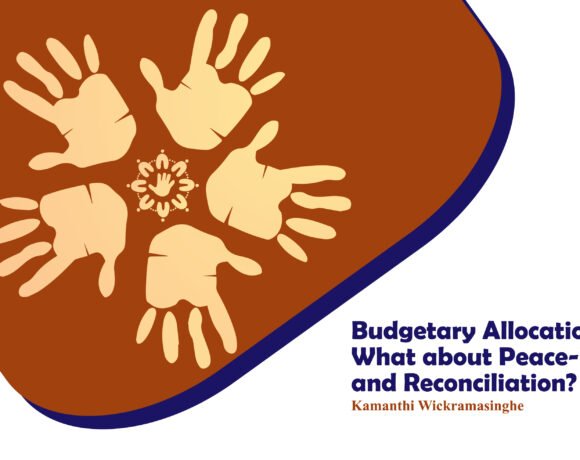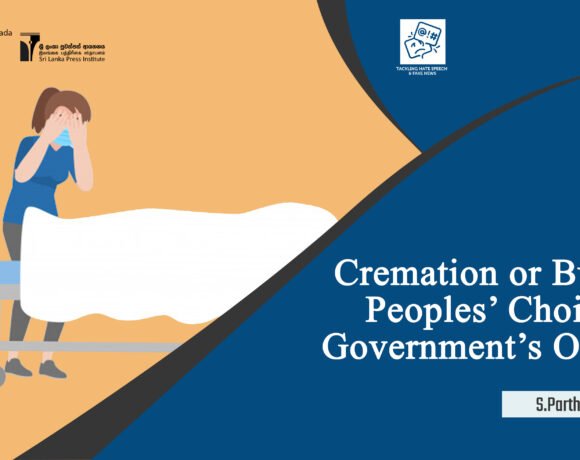Neville Uditha Weerasinghe
On the 04th of June 2019, the fasting protest held by Rev. Rathana Thero in front of the Sri Dalada Maligawa displaying his disapproval of the appointment of Mr. Hisbullah as the governor of the East came to an end only after the President at the time Hon. Maithreepala Sirisena made the executive decision to remove Hisbullah as Governor of the East, who was appointed by the President himself and replaced him with another. While the value of Hisbulla’s story started depreciating on mainstream media over the span of a few days, a poster consisting of a photograph of Rathana Thero and a phrase when translated to English that read, “Heartfelt gratitude of the nation to Rev. Rathana Thero for liberating the country from Muslim extremism and corrupt politicians”, was plastered all over and was a common sight in the city of Trincomalee.
The goal of this article is to look at the impact of separatist political views which were specifically established in the East due to the activities related to the ex-governor Hisbullah.
Following is an excerpt from a notice distributed among all the shops and stores within the city of Trincomalee by an organization named “Eastern Protection Organization.” after two weeks following the 2019 Easter Sunday attacks,
“Bodies of Sri Lankans who are Tamils, Muslims, Sinhalese, and Burgers are being piled up in our country. We are severely oppressed by terrorism and tax burdens that keep getting heavier. All industries including the Tourism industry will collapse. The Governor of the East keeps spreading hate, racism, and terrorism in Trincomalee, Batticaloa, and Ampara districts which in turn further oppresses and brings suffering and extreme pressure to the people of these districts. Let us abolish him and ask for a fair governor. Let us abandon all our work and services on the 10th of May 2019 in a united protest. Together, let us build a peaceful and bright future”
On May 10, 2019, from the 4th-mile post junction in Trincomalee to the main city, we could see a well-coordinated, united, and peaceful protest of people leaving aside all religions and races in honor of this cause. This was reported on all forms of media as well. However, on the day of said protest, an SLTB bus traveling from Trincomalee to Colombo was attacked and damaged by some of these protestors. At the China Bay junction, it could be seen that another set of people set fire to a pile of tyres in protest. The writer was also able to establish that the protest was pioneered and overseen by the Sinhalese people who work at the vegetable and fish markets in Trincomalee.
The phrase “We are Sinhalese, Tamils, Buddhists and Burgers, and Sri Lanka is our land” was seen in the aforementioned leaflet distributed by the Sinhalese community of businesspeople based in Trincomalee unveils a very important reality. According to my own experience, the majority of the Sinhalese business community of Trincomalee represent/follow a Sinhalese nationalist ideology. According to the 2012 census, 40% of the East consists of Tamils, 37% of Muslims, and 23% of Sinhalese. Based on district corresponding rates, the Ampara district consists of 17% of Tamils, 44% of Muslims, 39% of Sinhalese. In Batticaloa on the other hand the rates were, 72% Tamils, 25% Muslims and 1% Sinhalese. In Trincomalee, it showed 31% Tamils, 40% Muslims and 27% Sinhalese.
According to the above data, it is clear that the Sinhalese community is considerably lower in the East and appears as a minority in those areas. A protest in favor of Sinhalese nationalism disguised as an attempt to remove the Eastern Governor for the sake of all people of the east was not successful after all. This is how the protest against ex-governor Hisbullah came to be. Even though the people of the East (despite race and religion) were welcomed with open arms to join this protest, it was only the Sinhalese, Tamil, and Muslim businesspeople who contributed to this cause actively.
Through this protest, a clear transformation in the forms of tensions between ethnic groups in the Eastern Province was reflected. The historical background of anti-Muslim communism in the East has been discussed by many scholars. Following the Easter Sunday bombings, the common anti-muslim mentality of the Tamils in the East combined with the anti-Muslim views of the Eastern Sinhalese and brought together an alliance which later converted into a campaign to remove ex-governor Hisbulah from his seat. It could be observed that the real reason the Muslim businesspeople based in the East support this cause was not because of their genuine dislike of Hisbullah but rather the repercussions and hate that was targeted at the Muslim community as a whole after the Easter Sunday attacks.
“Due to the unexpected attacks by Saharan and his crew, we feared for our safety as the small business-owners of Trincomalee. We hoisted black flags and joined the protest mainly because of these reasons” – Mohammed Ishad
“The Tamils in Trincomalee had issues and concerns regarding the appointment of Hisbullah as the Governor of the East way before the Easter attacks took place.” – Mohammed Nasreen
Hisbullah is yet another politician accused of financial corruption in Sri Lanka despite him being a Muslim who was no better than the Sinhalese politicians who took part in similar crimes related to misuse of finances and mishandling of money. The parliamentary sectional monitoring committee of education and human resources and the co-op committee at the time brought about complaints and concerns over finances and financing of the University that was being built in Batticaloa under the guidance of ex-governor Hisbulla and the recommendation of the said committees were to overtake the entire process of building and running the University to the hands of the government. But, the protests of the Tamil community in the East against Hisbullah could be seen as advanced beyond hatred of his corruption. The cause behind these protests is the tension between communities in the East. A large number of Tamil Christians lost their lives due to the Easter Sunday attacks. The incident was a significant shock to the Tamil Christian community living in Trincomalee. The tension between the Muslim and Tamil communities in the East combined with the shock of the Easter Sunday attacks, the anti-muslim nature of the Tamils in the East began to escalate and they immediately joined the protests organized by the Sinhala business community of the East against Hisbullah to remove him from his position and to bring about change to the governance of the East. Following the Easter Sunday attacks, the Sinhalese and Tamil communities residing in the East and their growing hatred of Muslims based on totally different reasons to each community gradually became a common statement to remove Hisbullah from his post as governor.
The reason for this incident which occurred over two years ago based in Trincomalee regarding the Eastern Governor A. L. M. Hisbullah and the protests against him go down in history and have become a subject of great debate and discussion because of the already existing tension between communities in those areas. When considering the future and wellbeing of Sri Lanka and its people, it is crucial that these clashes and tensions between communities in the East are looked into deeply and carefully.









